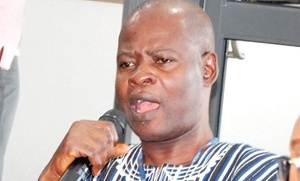Co-Chair of the Ghana Extractive Industry Transparency Initiative (GhEITI), Dr. Steve Manteaw, has expressed worry about Ghana National Petroleum Corporation’s (GNPC) readiness to be weaned off government financial support by 2026, as stipulated by law, stating that the company is not putting in place enough measures.
According to him, the government, as required under the Petroleum Revenue Management Act (PRMA), Act 815 section 7 (3), is to provide financial support to the corporation for 15 years from the date of promulgation of the Act in 2011, which ends in 2026.
However, with just about four years to reach the stated timeline, the corporation has over the years not managed its revenues efficiently to ensure that it is able to stay independent, make a profit and even pay dividends to the state.
“The running of GNPC is quite problematic. Its own statute of establishment, PNDC Law 64, indicates that GNPC should be finance through loans by raising funds on the financial market and investing same in their operations, make profits and pay back the loans, and also pay dividend to the state. But the PRMA changed that somehow and stated that government will spoon-feed them for 15 years.
“However, we have not seen how GNPC has laid the way to enable it generate revenue and pay dividend to the state when weaned off in 2026. And so, my fear is that by end of 2026, GNPC will not be ready to be taken off the budget; so we may have no option than to extend the time – which would be very unfortunate,” he said.
Citing examples from best practices elsewhere, he indicated that BP PLC is a British company that is headlining their oil and gas operations, while ExxonMobil is also playing active role for the USA. These firms also go outside their jurisdiction to operate and generate more revenue and repatriate profit to their country, and so GNPC is supposed to grow to such status and generate revenue for the state; but as it remains, the manner of operation only gives room for foreigners to generate revenue and repatriate same to the detriment of the nation.
The Ghana Extractive Industry Transparency Initiative (GhEITI) 2019 report, launched recently, indicated that the corporation received a total amount of US$279.23 million for the full year of 2019.
Dr. Manteaw believes that if stringent measures are not taken to diagnose the operation and use of GNPC revenue of which some are used for quasi-financial projects, it cannot be weaned off government subvention.
Transfers to GNPC from the government as required were in two forms; the share of petroleum revenues ceded to GNPC for the financing of Ghana’s production and development cost, and a portion of the net of petroleum revenues after equity financing ceded to GNPC for their day-to-day operations based on Parliament’s approval.
GNPC is entitled to a maximum of 55 percent of the net cash flow from the carried and participating interest after deducting the equity financing cost (including advances and interest of the carried and participating interests of the Republic). This arrangement would be in place for 15 years from date of the promulgation of the Act in 2011. Thus, it is expected that the funding arrangement will cease in 2026, he explained.
The GhEITI report found out that GNPC has engaged in several quasi-fiscal expenditures (QFEs) such as road construction, building infrastructure projects, among others, and transactions with other SOEs.
It is, therefore, recommending that GNPC should be reimbursed with all its QFEs advances as soon as possible. Where such reimbursements cannot happen in the short term, government should enter into repayment agreements to ensure that within a reasonable timeframe, GNPC is able to access the money to ensure that it is able to use it for the purpose for which it was allocated in the first place.
Again, it urges government to cease forthwith, the practice of urging GNPC to engage in quasi-fiscal spending any time it needs to meet a contingency.
He called for all stakeholders to stand up to diagnose the problems of the corporation and find solutions to ensure that the country would not have to extend the timeline. He also emphasised that it was time to discourage political interference in the operations of entity and allow it to operate as a professional corporation.










